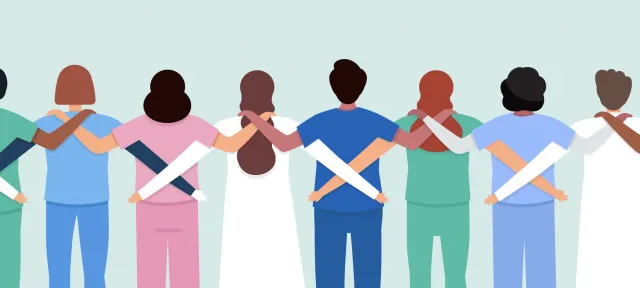Every day, many healthcare workers are heading directly into the places that people are trying to avoid during the pandemic — hospitals, urgent care facilities and medical offices. Many times in the past year, these professionals have navigated work overload, short staffing and, for some, daily exposure to COVID-19.
Considering all that they have done for us, how can we show our support for them? Here are six ways that you can help a healthcare hero:
1. Make a Donation
You can help healthcare workers by contributing to organizations. Since the early days of the pandemic, many organizations have initiated funds to support healthcare workers and supply them with the proper resources. Here are some examples of funds that you can give today:
- The Coronavirus Response Fund for Nurses was created by the American Nurses Association (ANA), It provides nurses with support in four main areas: mental health, access to the latest science-based information, national advocacy and financial assistance.
- ProjectN95 helps directly supply healthcare and essential workers with much-needed personal protective equipment (PPE).
- Crush COVID, created by the CDC, meets the urgent needs of healthcare workers. They distribute more than 7 million pieces of PPE, provide lab and medical equipment, support testing and research and fund care facilities and community-based organizations.
- World Central Kitchen, founded by chef José Andrés, works with restaurants to deliver fresh meals nationally to communities in need and fuels healthcare workers in hospitals and clinics.
Whether you can give $5 or $100, making a financial contribution to organizations focused on helping healthcare workers is an effective and efficient way to show your support. Your donation does not need to be just financial. You could also consider donating gloves, N95 masks, hot meals and health assistance.
2. Donate Blood
According to the American Red Cross, someone in the U.S. needed blood every two seconds even before the pandemic. As more public blood drives were canceled due to schools, community centers and public hubs being closed, the need for blood donations has increased substantially. If you are healthy and able to donate then this is a great way for you to give back.
There is often a critical shortage of blood. Blood is needed to help patients who suffer from blood disorders, cancer and other medical conditions. By donating, you will not only help healthcare workers, but you will also help save as many as three lives with just one donation.
The Red Cross makes it easy for you to find a nearby blood donation center and schedule an appointment. Additionally, all donation centers have made it their priority to adhere to social distancing guidelines and COVID-19 protocol to assure your safety.
3. Keep Up with Your Annual Checkups
Annual checkups are an essential step in diagnosing health problems before they turn into serious health issues. Neglecting to schedule these appointments doesn’t just make the conversation around your health disappear and could create more problems for you and work for healthcare professionals.
Since the start of the COVID-19 pandemic, many people have avoided scheduling their annual checkups. That can lead to more unmanaged medical conditions. For example, if your blood pressure increases to a level that puts you at risk, your primary healthcare provider will be able to detect it during the checkup and provide a plan for you to manage it. According to the Primary Care & Covid-19 Survey published by the Primary Care Collaborative, 62% of clinicians found an increase in the number of issues addressed per patient visit and the complexity of visits. Additionally, the lack of scheduled checkups contributed to 60% of clinicians reporting their patients’ health, unrelated to COVID-19, has worsened.
Like before the pandemic, it is essential to get annual checkups so that conditions like diabetes and heart health don’t go undetected and lead to complications. Organizations such as the American College of Cardiology and American Heart Association have responded to this drop by launching campaigns that urge patients to continue routine appointments. Immunizations, annual physicals and blood work - all of the things we used to get as kids - become even more important throughout adulthood and will help alleviate healthcare workers in the long run.
4. Be Respectful
If you are running late to your next appointment, sitting in the waiting room for a bit or just having a bad day, it is important to not take your frustrations out on the front desk person, nurse, physician’s assistant, doctor or other healthcare workers around. Being respectful goes beyond just saying “please” and “thank you,” it means identifying their crazy workload and remaining patient and considerate.
Or go to the next level and treat your friends and family members who work in the healthcare field by offering to make them dinner, running errands for them, helping them with childcare or simply by sending flowers to show them you care. Whether it is an act of service or a small favor, these kind gestures add up and help to make the healthcare workers in your life feel appreciated for all of their hard work.
5. Stay Home & Stay Healthy
One of the best ways to show your support for healthcare workers is to stay home, stay healthy and follow social distancing guidelines.
Reminding yourself to wash your hands, wear your mask, stay home if you are feeling sick, reduce contact with others and cover your nose and mouth when you cough or sneeze may seem like easy and obvious ways to stay healthy. However, if each person follows these practices then, collectively, it will help to minimize the length and impact of the COVID-19 pandemic and make a huge difference in relieving some of the strain on healthcare workers.
6. Send a Message of Gratitude
Thank them directly by sending a digital message or by mailing a letter to a healthcare worker in your life or to your nearby hospital’s HR department to pass it along. While it may seem simple, words of encouragement can actually go a long way after a long work shift.
If letters aren’t your style, then you can also show your support on social media. Use #SupportHealthcareHeroes in a meaningful tweet or express your gratitude through a video or photo and share it to your social network. Chances are that someone in your network works in healthcare! For them, seeing your recognition of their hard work may give them the extra boost that they need going into their next shift.
Now more than ever, our healthcare professionals are real-life versions of superheroes, however, let’s not forget that they aren’t superhuman. So, whether you decide to donate blood or send a kind thank you card, showing your support in any way will help healthcare workers feel recognized and appreciated.
Learn More About Our Healthcare Programs
* Bureau of Labor Statistics (BLS), U.S. Department of Labor, Occupational Employment and Wage Statistics 2023 / Occupational Outlook Handbook 2022. BLS estimates do not represent entry-level wages and/or salaries. Multiple factors, including prior experience, age, geography market in which you want to work and degree field, will affect career outcomes and earnings. Herzing neither represents that its graduates will earn the average salaries calculated by BLS for a particular job nor guarantees that graduation from its program will result in a job, promotion, salary increase or other career growth.





